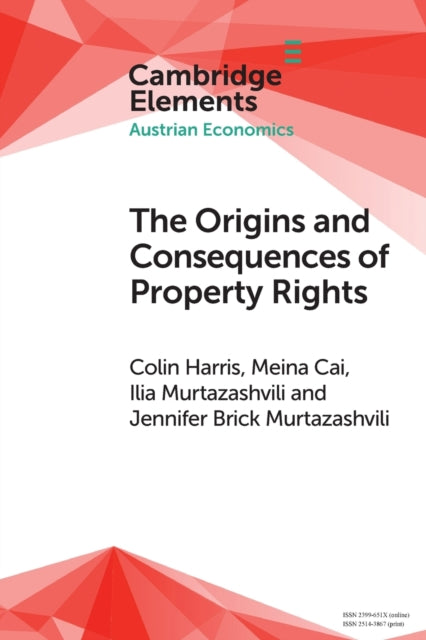ColinHarris,MeinaCai,IliaMurtazashvili,Jennifer BrickMurtazashvili
Origins and Consequences of Property Rights: Austrian, Public Choice, and Institutional Economics Perspectives
Origins and Consequences of Property Rights: Austrian, Public Choice, and Institutional Economics Perspectives
YOU SAVE £0.86
- Condition: Brand new
- UK Delivery times: Usually arrives within 2 - 3 working days
- UK Shipping: Fee starts at £2.39. Subject to product weight & dimension
Bulk ordering. Want 15 or more copies? Get a personalised quote and bigger discounts. Learn more about bulk orders.
Couldn't load pickup availability
- More about Origins and Consequences of Property Rights: Austrian, Public Choice, and Institutional Economics Perspectives
Property rights are the rules governing ownership in society, and this Element offers an analytical framework to understand their origins and consequences. It emphasizes the complementarity of insights from various disciplinary perspectives, such as Austrian economics, public choice, and institutional economics.
Format: Paperback / softback
Length: 75 pages
Publication date: 24 December 2020
Publisher: Cambridge University Press
Property rights are the rules that govern ownership within society. This Element provides an analytical framework to understand the origins and implications of property rights. It conceptualizes the political economy of property rights as a concern with the following questions: What explains the origins of economic and legal property rights? What are the consequences of different property rights institutions for wealth creation, conservation, and political order? Why do property institutions change? Why do legal reforms relating to property rights, such as land redistribution and legal titling, improve livelihoods in some contexts but not others?
In analyzing property rights, the authors emphasize the complementarity of insights from a diverse range of disciplinary perspectives, including Austrian economics, public choice, and institutional economics, including the Bloomington School of institutional analysis and political economy.
Property rights are essential for economic development and social welfare. They provide incentives for individuals to invest in property, create businesses, and generate employment. Property rights also promote stability and security by protecting individuals from arbitrary government action and providing a means of resolving disputes.
However, property rights can also be a source of conflict and inequality. In many societies, property rights are concentrated in the hands of a few individuals or families, leading to economic inequality and social exclusion. This can be particularly problematic in developing countries, where land and other natural resources are often scarce and contested.
Property rights institutions, such as land reform, legal titling, and property rights enforcement, can play a crucial role in addressing these issues. Land reform can redistribute land from large landowners to small farmers, increasing access to land and promoting economic development. Legal titling can provide a clear and secure legal framework for property ownership, reducing the risk of disputes and fraud. Property rights enforcement can ensure that property rights are protected and that individuals who violate them are held accountable.
However, the effectiveness of property rights institutions can vary depending on the context. In some cases, legal reforms may not have the desired impact if they are not implemented effectively or if they are undermined by political or economic interests. For example, land redistribution may not improve livelihoods if it is not accompanied by adequate support for small farmers, such as access to credit, training, and infrastructure.
In conclusion, property rights are essential for economic development and social welfare, but they can also be a source of conflict and inequality. Property rights institutions, such as land reform, legal titling, and property rights enforcement, can play a crucial role in addressing these issues, but their effectiveness can vary depending on the context. It is important to ensure that legal reforms are implemented effectively and that they are aligned with the needs and priorities of the people they are intended to benefit.
Weight: 180g
Dimension: 151 x 228 x 9 (mm)
ISBN-13: 9781108969055
This item can be found in:
UK and International shipping information
UK and International shipping information
UK Delivery and returns information:
- Delivery within 2 - 3 days when ordering in the UK.
- Shipping fee for UK customers from £2.39. Fully tracked shipping service available.
- Returns policy: Return within 30 days of receipt for full refund.
International deliveries:
Shulph Ink now ships to Australia, Belgium, Canada, France, Germany, Ireland, Italy, India, Luxembourg Saudi Arabia, Singapore, Spain, Netherlands, New Zealand, United Arab Emirates, United States of America.
- Delivery times: within 5 - 10 days for international orders.
- Shipping fee: charges vary for overseas orders. Only tracked services are available for most international orders. Some countries have untracked shipping options.
- Customs charges: If ordering to addresses outside the United Kingdom, you may or may not incur additional customs and duties fees during local delivery.


